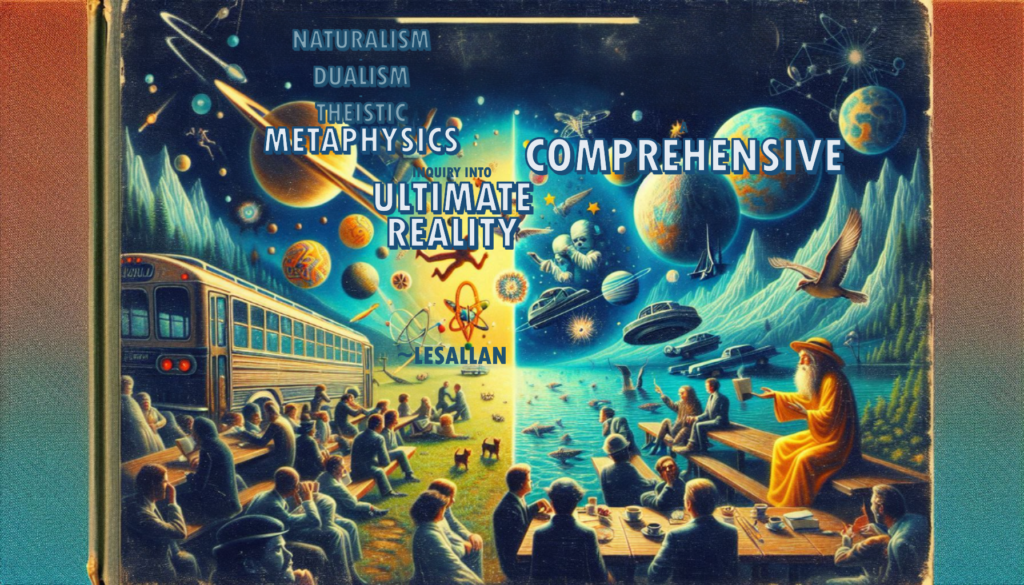
Naturalism, Dualism, and Theistic Metaphysics: A Comprehensive Inquiry into Ultimate Reality
Naturalism posits that only the material world exists, with all phenomena—including human rationality and morality—deriving solely from physical processes (Nash, 1999). On its own, this view champions the observable, empirical world as the sole bearer of reality. However, critics argue that naturalism is self-defeating if it must also rely on the very cognitive faculties, it deems merely the products of chance evolution. In other words, if our reasoning is nothing more than an evolutionary accident, trusting that same reasoning to validate naturalism becomes deeply problematic (Nash, 1999).
Alternative metaphysical models offer richer frameworks for understanding reality. Dualism, for example, argues that reality consists of both material and immaterial substances, thereby allowing for a non-physical dimension to human consciousness and moral intuition (Taliaferro, 2016). Theistic metaphysics takes this expansion further by positing a transcendent divine source that grounds both rationality and morality. As such, the reliability of human reason and the existence of objective moral standards are not purely accidental but are reflections of a deeper, divinely ordered reality.
Scriptural references from the King James Bible vividly reinforce this perspective. In Genesis 1:1 (KJV), the Bible declares, “In the beginning God created the heaven and the earth” (King James Bible, Gen. 1:1). This foundational verse not only marks the initiation of the physical cosmos but also implies that a divine, purposeful act establishes the structure of all reality. Furthermore, Psalm 14:1 (KJV) warns, “The fool hath said in his heart, There is no God” (King James Bible, Psalm 14:1), suggesting that a denial of God—and by extension, the transcendent source of all rational and moral order—leads to folly. Romans 2:15 (KJV) further asserts that “the law is written in their hearts,” implying that our innate sense of right and wrong directly reflects a divine imprint (King James Bible, Rom. 2:15). These passages underscore the argument that objective truth and moral norms have their ultimate foundation not in blind chance but in a transcendent, ordered source.
In summary, while naturalism maintains that the material realm is all that truly exists, it struggles to account for the reliability of human cognition and moral absolutism without resorting to self-refuting assumptions. In contrast, dualism and theistic metaphysics provide a compelling alternative by positing that reality includes both the physical and the immaterial—and that a divine creator not only sets the cosmos in motion but also inscribes a moral conscience and rationality within humanity. Such a view is bolstered by scriptural insights that have long affirmed that our understanding of truth, morality, and meaning is rooted in a higher, divine order (Nash, 1999; Taliaferro, 2016).
This enriched framework invites us to explore the layering of reality beyond what is immediately observable, urging us to consider that objective truth and ethical principles may be anchored in dimensions that transcend mere material existence. I hope this discussion deepens our understanding of why naturalism may be seen as a self-defeating theory and opens the door to richer explorations. For example, one might analyze how idealism or even panpsychism further challenges our notions of objective truth and layers of existence—an inquiry that continues to bridge philosophical debate with rational analysis and scriptural reflection.
In Christ Many Blessings,
Lesallan
References:
Nash, R. H. (1999). Life’s ultimate questions. Zondervan.
Taliaferro, C. (2016). Dualism and panpsychism. In K. K. Norton (Ed.),
Panpsychism: Contemporary perspectives (pp. 369–386). Oxford University Press. https://doi.org/10.1093/acprof:oso/9780199359943.003.0016



